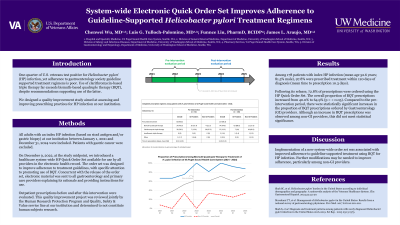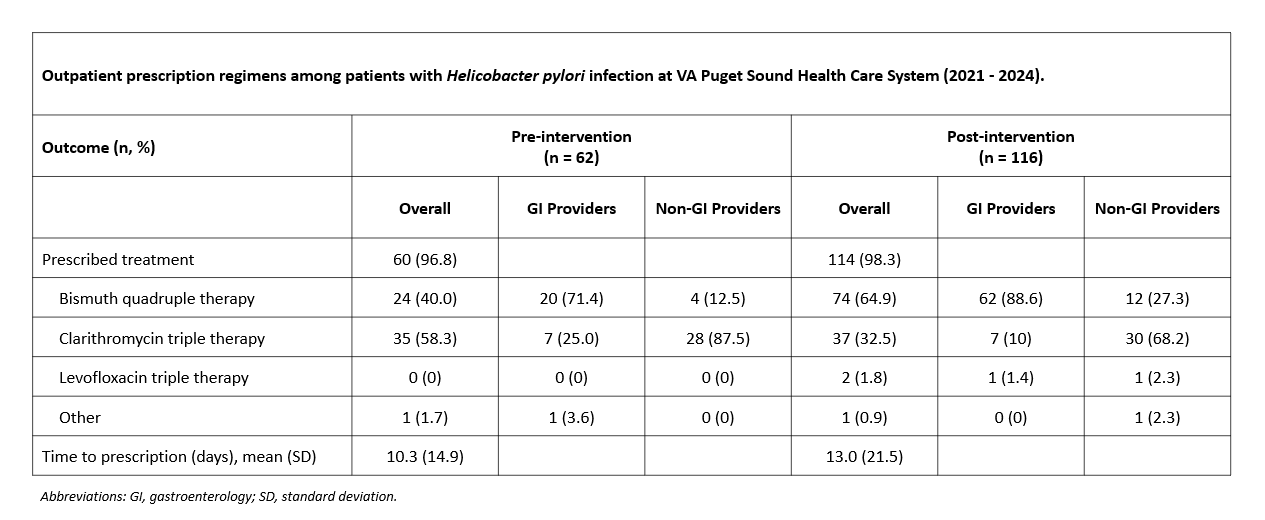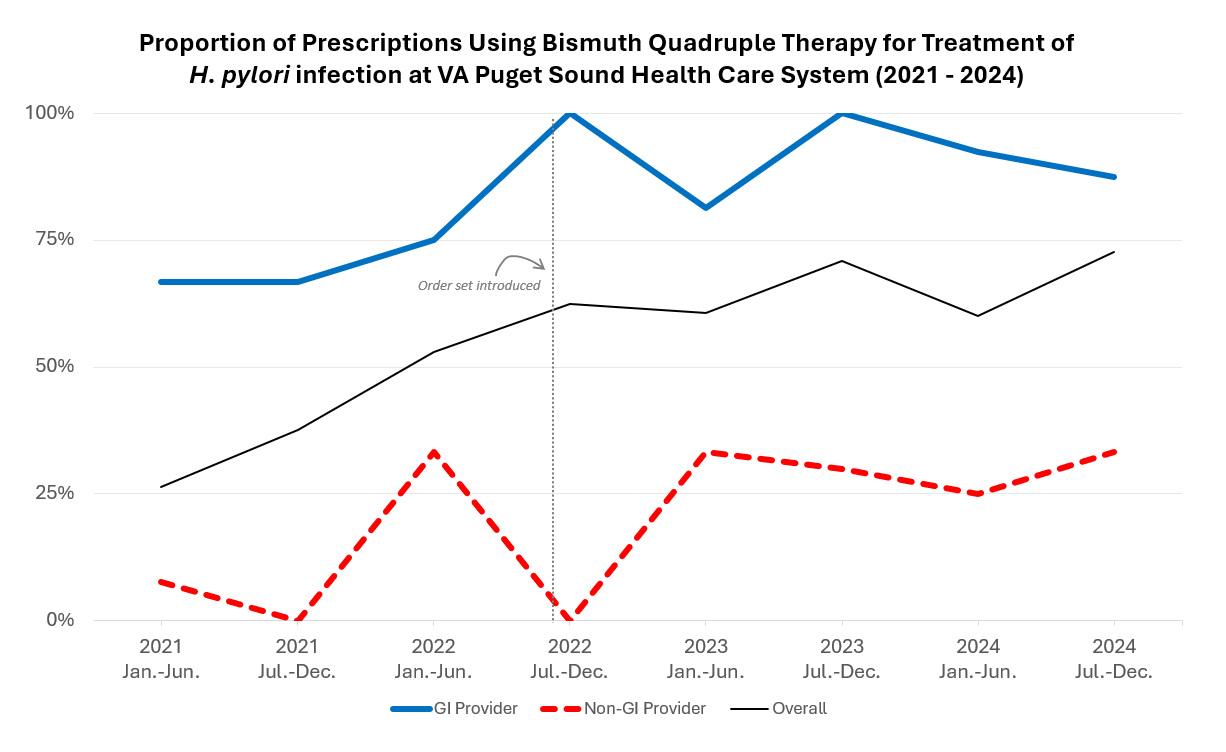Tuesday Poster Session
Category: Stomach and Spleen
P6326 - System-Wide Electronic Quick Order Set Improves Adherence to Guideline-Supported Helicobacter pylori Treatment Regimens
Tuesday, October 28, 2025
10:30 AM - 4:00 PM PDT
Location: Exhibit Hall

Has Audio

James L. Araujo, MD
University of Washington School of Medicine and VA Puget Sound Health Care System
Seattle, WA
Presenting Author(s)
Chenwei Wu, MD, Luis G. Tulloch-Palomino, MD, Funnce Liu, PharmD, James L. Araujo, MD
University of Washington School of Medicine and VA Puget Sound Health Care System, Seattle, WA
Introduction: One-quarter of U.S. veterans test positive for Helicobacter pylori (HP) infection, yet adherence to gastroenterology society guideline supported treatment regimens is poor. Use of clarithromycin-based triple therapy far exceeds bismuth-based quadruple therapy (BQT), despite recommendations supporting use of the latter. We designed a quality improvement study aimed at assessing and improving prescribing practices for HP infection at our institution.
Methods: All adults with an index HP infection (based on stool antigen and/or gastric biopsy) at our institution between January 1, 2021 and December 31, 2024 were included. Patients with gastric cancer were excluded. On December 9, 2022, at the study midpoint, we introduced a healthcare system-wide HP Quick Order Set available for use by all providers in the electronic health record. The order set was designed to improve adherence to treatment guidelines, with specific attention to promoting use of BQT. Concurrent with the release of the order set, electronic material was sent to all gastroenterology and primary care providers explaining its rationale and providing instructions for use. Outpatient prescriptions before and after this intervention were evaluated. This quality improvement project was reviewed jointly by the Human Research Protection Program and Quality, Safety & Value service line at our institution and determined to not constitute human subjects research.
Results: Among 178 patients with index HP infection (mean age 52.6 years; 81.5% male), 97.8% were prescribed treatment within 120 days of diagnosis (mean time to prescription 10.3 days) (Table). Following its release, 72.8% of prescriptions were ordered using the HP Quick Order Set. The overall proportion of BQT prescriptions increased from 40.0% to 64.9% (p = < 0.05) (Figure). Compared to the pre-intervention period, there were statistically significant increases in proportion of BQT prescriptions ordered by Gastroenterology (GI) providers. Although an increase in BQT prescriptions was observed among non-GI providers, this did not meet statistical significance.
Discussion: Implementation of a new system-wide order set was associated with improved adherence to guideline supported treatment using BQT for HP infection. Further modifications may be needed to improve adherence, particularly among non-GI providers.


Disclosures:
Chenwei Wu, MD, Luis G. Tulloch-Palomino, MD, Funnce Liu, PharmD, James L. Araujo, MD. P6326 - System-Wide Electronic Quick Order Set Improves Adherence to Guideline-Supported <i>Helicobacter pylori</i> Treatment Regimens, ACG 2025 Annual Scientific Meeting Abstracts. Phoenix, AZ: American College of Gastroenterology.
University of Washington School of Medicine and VA Puget Sound Health Care System, Seattle, WA
Introduction: One-quarter of U.S. veterans test positive for Helicobacter pylori (HP) infection, yet adherence to gastroenterology society guideline supported treatment regimens is poor. Use of clarithromycin-based triple therapy far exceeds bismuth-based quadruple therapy (BQT), despite recommendations supporting use of the latter. We designed a quality improvement study aimed at assessing and improving prescribing practices for HP infection at our institution.
Methods: All adults with an index HP infection (based on stool antigen and/or gastric biopsy) at our institution between January 1, 2021 and December 31, 2024 were included. Patients with gastric cancer were excluded. On December 9, 2022, at the study midpoint, we introduced a healthcare system-wide HP Quick Order Set available for use by all providers in the electronic health record. The order set was designed to improve adherence to treatment guidelines, with specific attention to promoting use of BQT. Concurrent with the release of the order set, electronic material was sent to all gastroenterology and primary care providers explaining its rationale and providing instructions for use. Outpatient prescriptions before and after this intervention were evaluated. This quality improvement project was reviewed jointly by the Human Research Protection Program and Quality, Safety & Value service line at our institution and determined to not constitute human subjects research.
Results: Among 178 patients with index HP infection (mean age 52.6 years; 81.5% male), 97.8% were prescribed treatment within 120 days of diagnosis (mean time to prescription 10.3 days) (Table). Following its release, 72.8% of prescriptions were ordered using the HP Quick Order Set. The overall proportion of BQT prescriptions increased from 40.0% to 64.9% (p = < 0.05) (Figure). Compared to the pre-intervention period, there were statistically significant increases in proportion of BQT prescriptions ordered by Gastroenterology (GI) providers. Although an increase in BQT prescriptions was observed among non-GI providers, this did not meet statistical significance.
Discussion: Implementation of a new system-wide order set was associated with improved adherence to guideline supported treatment using BQT for HP infection. Further modifications may be needed to improve adherence, particularly among non-GI providers.

Figure: Table: Outpatient prescription regimens among patients with H. pylori infection (2021-2024)

Figure: Figure: Proportion of Prescriptions Using Bismuth Quadruple Therapy for Treatment of H. pylori Infection (2021-2024)
Disclosures:
Chenwei Wu indicated no relevant financial relationships.
Luis G. Tulloch-Palomino indicated no relevant financial relationships.
Funnce Liu indicated no relevant financial relationships.
James L. Araujo indicated no relevant financial relationships.
Chenwei Wu, MD, Luis G. Tulloch-Palomino, MD, Funnce Liu, PharmD, James L. Araujo, MD. P6326 - System-Wide Electronic Quick Order Set Improves Adherence to Guideline-Supported <i>Helicobacter pylori</i> Treatment Regimens, ACG 2025 Annual Scientific Meeting Abstracts. Phoenix, AZ: American College of Gastroenterology.
